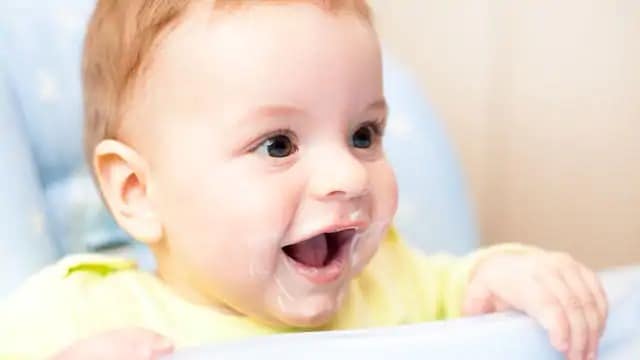Sleeping with Milk: Effects on the Teeth![]()

What Is Baby Bottle Decay or Early Childhood Caries (Cavities)?
Baby bottle tooth decay is the name given to tooth decay caused by using a baby bottle as a sleep aid. When a child falls asleep with a bottle full of milk or juice, some of the liquid from the bottle pools behind the sleeping child's front teeth. The bacteria that cause cavities then have all the time and sugars they need in order to erode the enamel on those tiny teeth.
Early childhood cavities caused by bottle feeding are most often apparent in the top front teeth, as the nipple of the bottle prevents saliva from washing away the sugars from the top incisors. The bottom front teeth may also be affected, though they are more protected by saliva and the tongue.
Common Causes of Baby Bottle Tooth Decay or Early Childhood Caries (Cavities)
The primary cause of baby bottle syndrome is putting your child to sleep overnight with a bottle of juice, milk, or other liquid containing sugars. It can also occur if your child breastfeeds, as breast milk also contains sugars. If your child falls asleep nursing, milk can sit on the teeth overnight. While it is typically not as extensive as you’d find from a bottle, decay can still occur.
Similar damage can also be seen from extended use of a bottle or sippy cup at any time of day. For example, if your child uses a bottle to self-soothe or drift off for a nap, they may spend lots of time with their teeth bathed in liquid and sugar throughout the day. And if you dip your child’s pacifier in honey, juice or other sweet liquids, they can also experience decay.
How to Prevent Baby Bottle Tooth Decay or Early Childhood Caries (Cavities)
According to the American Dental Association, early childhood cavities are entirely preventable by doing a few simple things to ensure your child's teeth are clean, healthy and strong.
- If your child needs a bottle to fall asleep, or if you're using a bottle as a pacifier during the day, fill it with water rather than milk, juice or any other beverage.
- If your child falls asleep while feeding, remove the bottle or take them off the breast as soon as you notice they’re no longer sucking.
- Begin brushing your child's teeth as soon as they erupt. Begin flossing as soon as they have two baby teeth that are touching.
- Teach your child to drink from a cup rather than a bottle by about six months. Children should be weaned from the bottle by about one year old.
- Bring your child to a pediatric dentist after the first tooth erupts and before the age of one. Your dentist can warn you of any potential problems with your child's teeth and gums and give you advice on how to improve their oral health.
Your child's baby teeth will help them chew and speak in the coming years, and will hold a place in the jaw for the permanent teeth to grow in straight. Taking care of them from the moment they first begin to erupt can prevent the unnecessary discomfort caused by baby bottle syndrome and other early childhood dental problems.

FAQ - About Cavities and Milk
How can I tell if my child has cavities from milk?
Tooth decay from sleeping with milk most commonly occurs in the top front teeth, but it can be found in any tooth. The early signs of tooth decay are not always visible, but you may notice white spots on your baby’s teeth. As tooth decay advances, you might notice yellow or brown discoloration of the teeth, and you may be able to see cavities, or holes, in the teeth.
What age group is most at risk for cavities from sleeping with milk?
All babies and children who take bottles are at risk of baby bottle syndrome.
Can breastfeeding at night also contribute to baby bottle syndrome?
Yes. Breast milk contains natural sugars, and children can experience similar tooth decay from breastfeeding before bedtime. If the child falls asleep while feeding, breast milk can sit in the mouth and on the teeth throughout the night. Ideally, teeth should be cleaned after the last feed and nothing to eat or drink except water (for children 6 months and older) until the morning. If it's extremely difficult to brush after the last feed, make sure to prioritize brushing the teeth first thing in the morning.
How often should I clean my child's bottle to prevent cavities?
You should clean your child’s bottle after every feed and sterilize them at least once every day. However, you should keep in mind that this alone will not prevent cavities from forming on the teeth from sleeping with milk. If your child takes a bottle overnight, the most effective thing you can do is to make sure it contains nothing but water.





